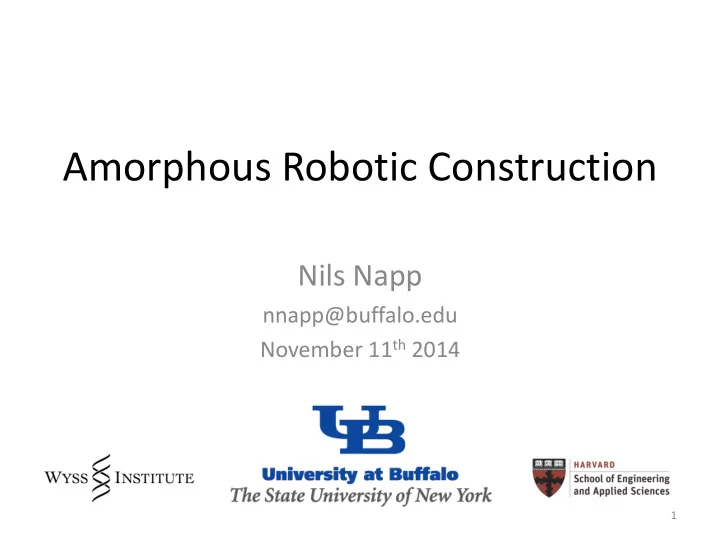

Amorphous Robotic Construction Nils Napp nnapp@buffalo.edu November 11 th 2014 1
Robots Building Stuff 2
Robotic Construction in Messy Environments 3
Related Work Petersen, Werfel, Nagpal 2011 Khoshnevis 2004 4 Rus, Lipson, Yim Lindsey, Mellinger, Kumar 2010 D’Andrea 2010
Biological Inspiration K. Petersen , N. Napp, J. Chin-Lee, J. Werfel and R. Nagpal, 3D Tracking of Building Processes in 5 Macrotermes , Visual Observation and Analysis of Animal and Insect Behavior, Workshop (ICPR), 2012.
Biological Inspiration 6
Outline • Algorithm Design – Adaptive Ramp Building Problem – World and Material Model – Navigable Structures – Ramp Building Algorithm(s) • Experiments – Working in 3D – Deposition Experiments 7
Adaptive Ramp Building Develop algorithms and robots to build in unstructured environments N. Napp , J. M. Wu, O. R. Rappoli, and R. Nagpal, Materials and Mechanisms for Amorphous Robotic Construction . IROS 12 8
Algorithmic Challenges 1. Modeling Amorphous Depositions 2. Planning with Amorphous Depositions 9
Outline • Algorithm Design – Adaptive Ramp Building Problem – World and Material Model – Navigable Structures – Ramp Building Algorithm(s) • Experiments – Working in 3D – Deposition Experiments 10
Modeling Structures : finite building area : robot position : height function 11
Modeling Structures : finite building area : robot position : height function 12
Modeling Amorphous Depositions • Shape defined by the environment • Conforming on bottom • Top defined by shape function : 13
Modeling Amorphous Depositions Deposition operator INPUT: shape function and height function OUTPUT: new height function 14
Outline • Algorithm Design – Adaptive Ramp Building Problem – World and Material Model – Navigable Structures – Ramp Building Algorithm(s) • Experiments – Working in 3D – Deposition Experiments 15
Maximum Climbable Steepness A function is called K -Lipschitz iff 16
Navigable: Almost, Locally, Lipschitz A function is called navigable iff 17
Navigable: Almost, Locally, Lipschitz A function is called navigable iff 18
Navigable: Almost, Locally, Lipschitz A function is called navigable iff 19
Navigable: Almost, Locally, Lipschitz A function is called navigable iff 20
Outline • Algorithm Design – Adaptive Ramp Building Problem – World and Material Model – Navigable Structures – Ramp Building Algorithm(s) • Experiments – Working in 3D – Deposition Experiments 21
Local Reactive Algorithm for Making Navigable Structures Algorithm orithm 1 1. Given 2. Set 3. While violating the navigability condition 4. Set to be point with lower h value (wlog assume ) 5. Pick deposition height 6. Deposit at : 7. Set 8. EndWhile 22
Local Reactive Algorithm for Making Navigable Structures Algorithm orithm 1 1. Given 2. Set 3. While violating the navigability condition 4. Set to be point with lower h value (wlog assume ) 5. Pick deposition height 6. Deposit at : 7. Set 8. EndWhile 23
Stopping for Algorithm 1 Guaranteed progress Bounded above Each deposition has a minimum Depositions never add material Volume. above . Proof based on point selection, Proof based on point selection, and deposition steepness and and the inequalities continuity assumptions on . 24
Adaptive Ramp Building (Alg 2) Algorithm orithm 2 1. Given and navigable terrain around v . 2. Set 3. While 4. Move until are non-navigable or 5. If 6. Move to lower point and deposit according to Alg. 1 7. Move backward to 8. EndIf 9. EndWhile Proof based on termination of Alg.1 and backing up from depositions that might have altered previously navigable terrain. 25
Adaptive Ramp Building 426 Steps Start Goal N. Napp and R. Nagpal, Distributed Amorphous Ramp Construction in Unstructured Environments . DARS 2012 26
Outline • Algorithm Design – Adaptive Ramp Building Problem – World and Material Model – Navigable Structures – Ramp Building Algorithm(s) • Experiments – Working in 3D – Deposition Experiments 27
Using Algorithm 2 in 3D Leveling Mechanism Level Deposition with Conical Cross Section 28
Experiment: Messy Leveling Translating Carriage Distance Sensor Mixing Nozzle 29
Experiment: Messy Leveling 30
Foam Depositing Robot 31
Robot Depositing Foam 32
Foam Ramp 7 6 5 4 3 1 2 33
Summary • Amorphous building materials can enable robust construction in irregular terrain • Model terrain with continuous functions • Bound shape uncertainty with shape functions
Future Work Construction in Cluttered Terrain • Use models to build other structures • Reliable construction with found objects • Extend to probabilistic setting 35
At UB • Teaching CSE 668: Advanced Robotics – Spring 2015 (MWF 12:00pm) – Previously called (Animate Vision Principles) • Looking for Students – Take my class/work on a project with me – E-mail: nnapp@buffalo.edu – Office hours: Tue/Thur 10:00-11:00am 36
Recommend
More recommend